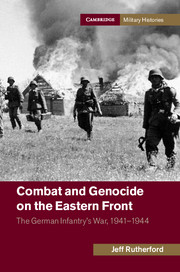Book contents
- Frontmatter
- Table of contents
- List of illustrations
- List of figures
- List of maps
- List of tables
- Acknowledgments
- Introduction
- 1 The Wehrmacht and German society
- 2 Preparations for war
- 3 “Attack with a ruthless offensive spirit and … a firestorm of destruction”
- 4 “Will the continuation of this attackbe worth it?”
- 5 “It is only a question of where, not if, civilians will starve”
- 6 The failure of Operation Barbarossa
- 7 The Soviet winter offensive, 1942
- 8 “The population … shouted out to the interpreter that one would rather be shot instead of being left to starve”
- 9 “From one mess to another”
- 10 “We need to fight to the end, so oder so”
- 11 A more rational occupation?
- 12 “As miserable representatives of themiserable twentieth century, we burnedall of the villages”
- Conclusion
- Bibliography
- Index
- References
2 - Preparations for war
Published online by Cambridge University Press: 05 July 2014
- Frontmatter
- Table of contents
- List of illustrations
- List of figures
- List of maps
- List of tables
- Acknowledgments
- Introduction
- 1 The Wehrmacht and German society
- 2 Preparations for war
- 3 “Attack with a ruthless offensive spirit and … a firestorm of destruction”
- 4 “Will the continuation of this attackbe worth it?”
- 5 “It is only a question of where, not if, civilians will starve”
- 6 The failure of Operation Barbarossa
- 7 The Soviet winter offensive, 1942
- 8 “The population … shouted out to the interpreter that one would rather be shot instead of being left to starve”
- 9 “From one mess to another”
- 10 “We need to fight to the end, so oder so”
- 11 A more rational occupation?
- 12 “As miserable representatives of themiserable twentieth century, we burnedall of the villages”
- Conclusion
- Bibliography
- Index
- References
Summary
In the summer of 1940, Nazi Germany triumphantly stood astride the European continent at the apex of its power. Following the defeat of Poland, Germany turned west and, in remarkable campaigns that lasted a mere ten weeks, conquered Denmark, Norway, and the Low Countries, and defeated the “hereditary” enemy of France while forcing the British into two humiliating retreats from the continent. The beginnings of the Battle of Britain took shape following the conquest of France and, as summer moved into fall, the Luftwaffe rained destruction down on British cities. To the east, Hitler’s newfound ally – the Soviet Union – seemingly worked with Berlin in dividing eastern Europe into spheres of influence, while simultaneously providing Germany with the delivery of much-needed raw materials and foodstuffs.
Despite this favorable military position, the German imperium still faced various threats. First, the determined resistance emanating from Whitehall ensured that Great Britain and its empire would remain in the war; such an eventuality gave second thoughts to those who remembered Great Britain’s decisive contribution to German defeat during the First World War. Second, the Soviet Union pursued an increasingly aggressive foreign policy in the Balkans that clashed with German interests. Finally, a progressively worsening food situation within continental Europe as a whole and in Germany more specifically undermined the Reich’s actual power. Fixated on the experiences of the First World War – one characterized by the notion of total war – the Reich’s military and political leadership paid special attention to the German home front.
- Type
- Chapter
- Information
- Combat and Genocide on the Eastern FrontThe German Infantry's War, 1941–1944, pp. 56 - 83Publisher: Cambridge University PressPrint publication year: 2014



